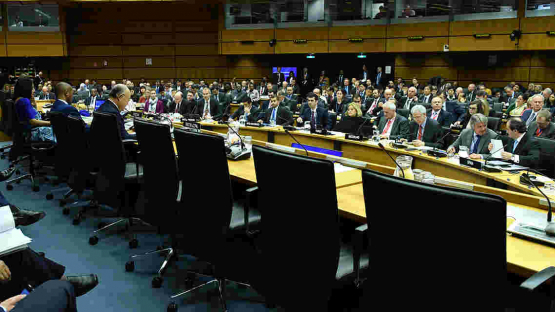IAEA Director General Yukiya Amano provided an overview of global trends in nuclear safety, security and nuclear energy and an update on the Agency’s verification and monitoring activities in Iran in his opening statement to the Agency’s Board of Governors today.
“There is increasing interest in the peaceful uses of nuclear technology and the need for Agency nuclear verification activities is growing steadily,” Mr Amano said at the opening of the meeting.
Nuclear safety and security
A number of documents in the area of nuclear safety and security are on the agenda, including the Nuclear Safety Review 2017 and the first draft of the IAEA Nuclear Security Plan 2018-2021.
He emphasised the importance of building on the Action Plan for Nuclear Safety that was adopted after the Fukushima Daiichi accident in 2011. “We will consider ways of further strengthening our work in nuclear, radiation, transport and waste safety,” he said, adding that the IAEA will continue to focus on regulatory effectiveness, safety culture and capacity-building.
Noting that the 7th Review Meeting of Contracting Parties to the Convention on Nuclear Safety (CNS) would take place in Vienna from 27 March to 7 April, Mr Amano said: “Through its peer review process, the Convention has made a significant contribution to strengthening nuclear safety in the countries which are party to it.” He encouraged all countries that have not yet done so to join the CNS.
The Nuclear Security Plan will guide the IAEA’s work over the next four years in helping Member States to prevent nuclear and other radioactive material from falling into the hands of terrorists. “Our focus is on concrete measures which will be of practical value to all countries as they work to strengthen nuclear security,” Mr Amano said.
Nuclear energy
The Board will also consider the Nuclear Technology Review 2017, which includes an overview of global developments related to nuclear power.
“Nuclear power contributes significantly to meeting the goal set under the Paris Agreement of holding the increase in global temperature well below 2°C above preindustrial levels, and to achieving the Sustainable Development Goals,” Mr Amano said.
The Review also highlights the key role of technological innovation. “Innovative nuclear power technologies, including small and medium sized or modular reactors and advanced fuel cycles, could more efficiently contribute to reducing greenhouse gas emissions and extend the role of nuclear power into new applications,” the Director General added.
Mr Amano noted continued good progress in the establishment of the IAEA LEU Bank in Kazakhstan. “Construction of the LEU Storage Facility is proceeding on schedule and Kazakhstan expects to have the facility built, and ready to receive LEU, by September this year.”
Mr Amano invited Member States to the IAEA Ministerial Conference on Nuclear Power in the 21st Century taking place in Abu Dhabi in October. At the conference, senior officials, operators and regulators will consider the contribution of nuclear power to energy security and to mitigating the effects of climate change.
Nuclear applications
Mr Amano said the modernisation of the IAEA’s nuclear research laboratories under the ReNuAL project was proceeding on schedule and within budget.
“Since the funding target for ReNuAL was achieved, over four million Euros in extrabudgetary funds have been pledged or provided for ReNuAL+,” he said, introducing the next phase of fund raising. “If we receive an additional two million Euros in extrabudgetary funds by June this year, we can maximize cost efficiencies in the construction of the third wing of the Flexible Modular Laboratory.”
Mr Amano announced that the theme of the annual IAEA Scientific Forum this September will be the use of nuclear techniques in health care, focusing on the latest advances in in disease prevention, diagnosis and cure.
Technical cooperation
Mr Amano emphasised the importance of the IAEA technical cooperation programme as the key mechanism for the delivery of IAEA services to Member States under the Agency’s Atoms for Peace and Development mandate.
He encouraged countries to actively participate in the International Conference on the IAEA Technical Cooperation Programme, to be held from 30 May to 1 June. The aim of this conference is to raise awareness of the achievements and potential of the technical cooperation programme and ensure greater recognition for the IAEA’s work on assisting sustainable development, he added.
Verification
The IAEA has been verifying and monitoring the implementation by the Islamic Republic of Iran of its nuclear-related commitments under the Joint Comprehensive Plan of Action since January 2016. Evaluations regarding the absence of undeclared nuclear material and activities in Iran continue, he told the Board.
Mr Amano again expressed serious concern about the nuclear programme of the Democratic People’s Republic of Korea.
“It is deeply regrettable that the DPRK has shown no indication that it is willing to comply with the UN Security Council resolutions adopted in response to its two nuclear tests last year,” he said. “I again call upon the DPRK to comply fully with its obligations under Security Council resolutions, to cooperate promptly with the Agency, and to resolve all outstanding issues, including those that have arisen during the absence of Agency inspectors from the country.”


